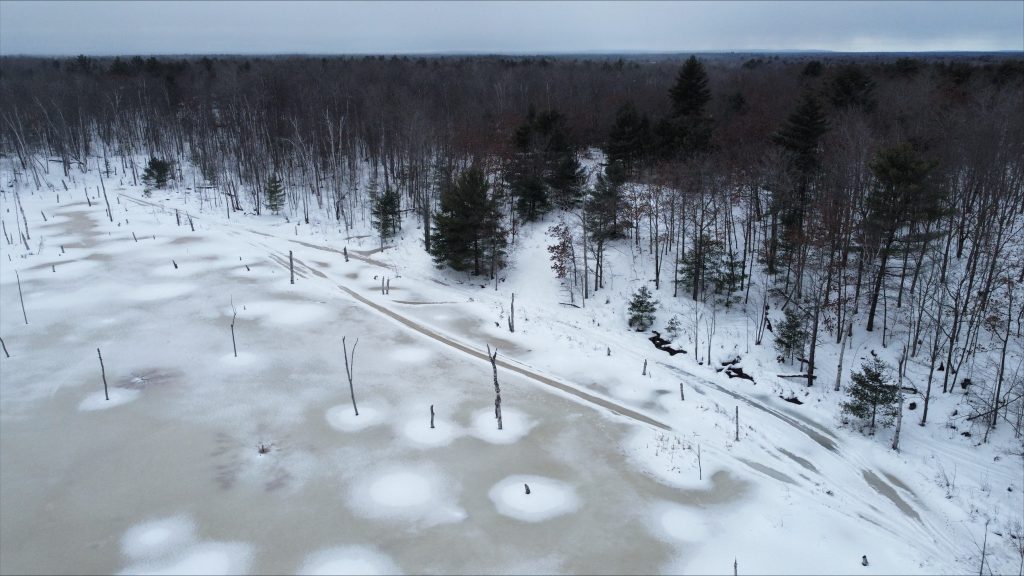Volunteers with local snowmobile clubs are holding out hope for the rest of the season, working to groom and prepare trails as they contend with unusually warm and wet weather conditions.
Director Steve Brooks with the Muskoka Sno-Bombers, a Bracebridge-based non-profit dedicated to snowmobiling, said their team of volunteers has put more effort into the trails this year than any other year he’s been involved. Their preparations included extensive preseason scouting and clearing, but after snow and rain, the weight on trees is bringing down more branches and debris. Brooks said their efforts to prep and clean the trails may be in vain if the weather doesn’t cooperate.
“There’s creeks flowing across trails that are indicative of springtime thaws,” Brooks said of their trail survey on Jan. 29. “It was plus four and sunny. It was a gorgeous day but not for building trails.”
Brooks said they’re trying to stay positive despite a mediocre forecast. Most riders have been respecting trail closures, so he urges continued patience and reminds snowmobilers to check the Ontario Federation of Snowmobile Clubs (OFSC) Trail Guide for official updates.
Bored or disappointed snowmobilers are welcome to get outside with the Sno-Bombers to do tasks like clearing and brushing the trails. It’s also a great way for high school students to complete their volunteer hours, so anyone interested in helping can follow the group’s Facebook page for updates.
While it’s frustrating for all involved, Brooks said they’re limited in the work they can do because of deep swamps throughout their network.
“When the swamps aren’t frozen, it’s a big showstopper for us,” Brooks said.
Though it’s hard to speculate about the rest of the season, Brooks said the Sno-Bombers are keeping trails clear to ensure they can get out and open the network as soon as weather permits. In addition to being landlocked, problems caused by the warm weather were also evident as they tried to install stakes to guide the groomer through the fields earlier in the season.
“Usually, if you’re doing it in January, it’s too late and there’s too much frost to get the field stakes in,” he said. “We were hitting them with a sledge, and they sunk right into the dirt. Cold weather: it’s what we need.”
In the meantime, Brooks encourages locals to take a drive to their favourite restaurants, hotels and other businesses that rely on snowmobilers in the winter. There are just under 6,000 kilometres open out of roughly 32,000 kilometres of trail in Ontario, and with next to nothing available in central and southern Ontario, businesses are feeling the squeeze.
Steve Elliott, president of the Muskoka Lakes Snow Trails Association (MLSTA), echoed the call to support businesses, adding that this winter has been a letdown for clubs across Ontario and Quebec. Grooming equipment requires about 16 inches of solid ice to support its weight, leaving most clubs out of luck.
“For the MLSTA, every single trail in our network has multiple swamp crossings that must be deemed safe before we cross with our groomer,” Elliott said. “Club volunteers have been out there many [nights] flooding these crossings to try to build up the ice surface, but with all this mild weather, it seems like a losing battle.”
Regardless, MLSTA volunteers have no plans to give up. They’re saving up to build a new groomer shed and can always use more volunteers, so those interested can email the MLSTA at muskokasnowtrails@outlook.com or reach out on Facebook.
They recently started using drones to assess trail conditions along potentially unsafe water crossings in addition to surveying possible reroutes. They’re aiming to get trails open as soon as possible and hope that temperatures will allow for riding well into March.
Elliott recommends that snowmobilers try new riding destinations on Ontario’s available trails. For those that can’t make it up north, colder nights could be ahead, so with a little more snow, he hopes they might be able to open at least some of their trail network. They know it’s important to their ridership and local businesses, so Elliott said MLSTA volunteers will keep doing their best.
“The biggest advice I can give right now is to do whatever cold or snow dance has worked in the past,” Elliott said. “It’s actually quite normal for trails in Muskoka not to open until late January, so although it may seem dismal, winter can quickly turn around and still give us a few great weeks of riding.”
